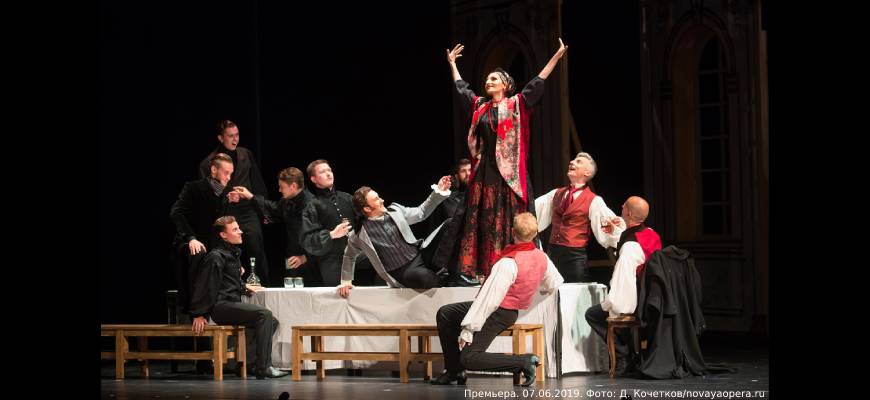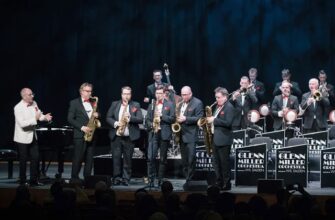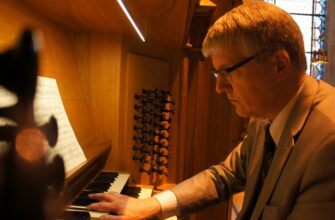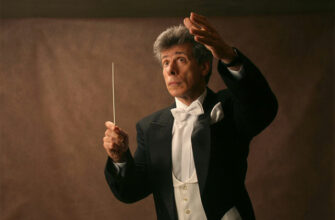Opera “the Poet and the King”, striking in its depth and passion, was firstly performed at Kolobov New Opera on 04 February 2017 during the Epiphany festival. Music was created by a Russian composer Konstantin Boyarsky, and a libretto was written by English writer Marita Phillips.
The hero of the Opera is the great Russian poet Alexander Pushkin. The time frame of the poem covers the period from the massacre of Decembrists in 1826 until the death of the poet after being wounded in a duel in 1837.
The center of the story is the relationship of the poet with the power, Tsar Nicholas I. the Tangle of contradictions, combined with family problems, lack of money and social turmoil, results unbearable suffering, which leads the passionate poet to the inevitable death.
Libretto by Marita Phillips is written in English and the Opera is sung in English too, but the A. Pushkin’s poems are recited in native Russian language. This idea belongs to the writer, and agreed with composer K. Boyarsky. In an interview with “E-Vesti” M. Phillips explained her decision in that way: “Poet and Tsar” is written in English because that is my language. But this is an opera about the life of a creative genius – so it is really important to give a sense of what he created. I chose poems or excerpts from Pushkin poems that are relevant to what is happening in the narrative. For me it is essential they are said or sung in Russian; it creates another musical element that gives atmosphere. Also it is really not possible to translate his poems.”
The content of the Opera, despite the fact that it gives a subjective vision of the tragedy, is absolutely reliable in its historical facts. Pushkin’s historical works were accurate too; he often referred to the sources. Apparently, this is due to the fact that the author spent many years collecting material for the Opera and thought of the poet’s destiny, as well as the fact that Marita Phillips is a great-great-great-granddaughter of Alexander Pushkin and Nicholas I both.
Marita admits that, despite the fact that she is British, feels a Russian blood too: «I have often been asked that question and I used to answer that many people, who maybe don’t have any Russian blood, also love and respond to the incredible wealth and depth of Russian literature, music, dancers, singers, artists – not just me because I have Russian blood. However, in truth, I do feel it. Though I realize I have a British veneer!».
Apparently, it helped Marita Phillips to recreate the Russian ideological and spiritual space of the first half of the XIX century, although her Russian ancestors did not try to preserve their national identity after departure from Russia. «As a child I presumed my grandmother’s accent was Russian – it was in fact French. She was born in Germany, lived in France and then England. She had many Fabergé objects which I was fascinated by – especially the little elephants with jeweled eyes. Her mother had 5 letters of Pushkin that he had written to Natalya. She sold these to Diaghilev, and he left them to Serge Lifar. When Lifar died they came back to Russia.»
The character of Alexander Pushkin, who, being always loyal to his friends and their convictions, deludes himself for some time about the Tsar’s intentions and makes unsuccessful attempts to glorify him, is shown in the opera as an innocent victim which is killed by a shot through his Achilles’ heel – passion. The same setup was used to hound and destroy other poets of the epoch, such as Ryleyev, Bestuzhev, Griboyedov, Lermontov…
Is it easier today to be a poet, and freely do their work – we asked Marita Phillips as a poet: «I think the external life of a poet is different today but I don’t think their internal world has changed. The poet or creative is a particular type of personality and one that does not necessarily make life easy to live, whatever the circumstances. There is a compulsion to transform experience, to express truths from the unconscious that often they don’t even fully understand themselves. There will always be obstacles challenging their integrity: political, religious — nowadays often commercial. But poets have to write for themselves and tell their own truth regardless. So even if life is better today that does not mean their spirit is freer».
The Russian premiere was a success. The audience welcomed the opera, deprived of popular effects, gloss of the costumes and the scenery, because its artistic merit is undeniable. Awesome music, melodious and clear, with beautiful vocal lines and vivid images, rising to the denouement of the drama, we believe, will ensure further success of Opera on a tour around the world.




